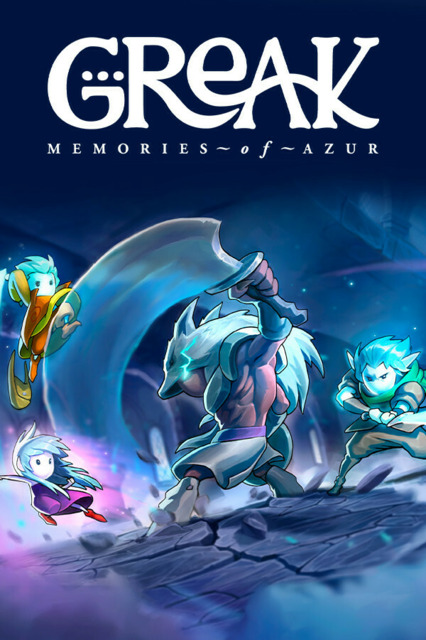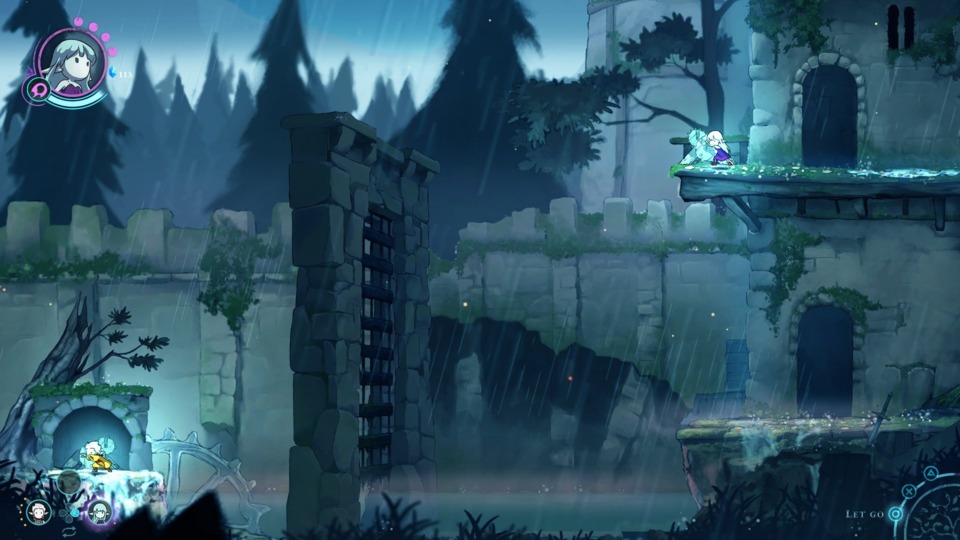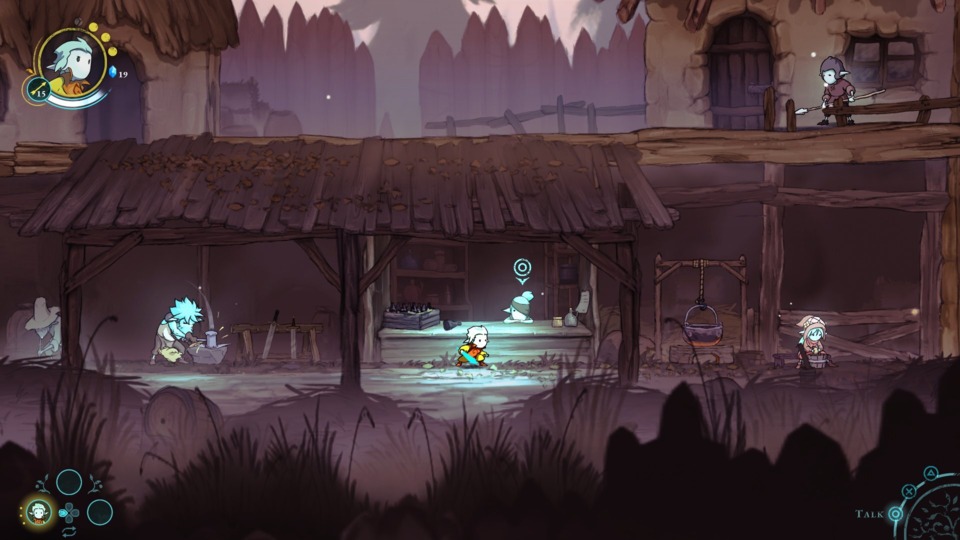Indie Game of the Week 294: Greak: Memories of Azur
By Mento 0 Comments

Well, we're back in explormer land, at least somewhat. Greak: Memories of Azur is an action-adventure game with some mild explormer backtracking elements where you control three characters—though it takes a while before you assemble the full party—with some standard combat encounters and puzzles to solve. The multiple protagonists are controlled The Lost Vikings style: rather than vanish from the world (or hang out at the save point) when it isn't their turn in the driver's seat they can be left behind or ordered to follow the active character, and they can still take damage and miss platforms if you aren't careful to keep yourselves properly grouped up. Multiple puzzles require that you leave someone behind on a switch or holding a lever to allow the others to proceed, often with the understanding that they then find a switch on the other side that keeps the barrier lifted to let that left behind member to catch up. The slight awkwardness of this system and how it exists to make the game harder is perhaps why it takes a while before you find the second and third members of your group.
Greak: Memories of Azur is set in a world where the civilized Courines are at risk of annihilation from the barbaric Urlags, who suddenly attacked in a massive horde and quickly overran the Courine fortresses and other defended positions. The game begins following a Courine survivor, the titular diminutive scout Greak, as he first attempts to find shelter in one of the few Courine outposts remaining and then from this base look for his missing siblings: his older sister Adara, who has been trained as a magic-using Oracle; and his older brother Raydel, a burly warrior and former guard. While all quite capable of taking care themselves, they each possess different strengths and weaknesses in addition to their unique abilities: for instance, when it comes to swimming, Adara can hold her breath considerably longer than Greak, while Raydel sinks immediately due to his armor.

While the world is relatively small, each region has its own share of secrets and items to find: in some cases, only one character has the right abilities to explore further. Traversal overall feels good with fluid movement and plenty of wall-jumps and similar skills to keep yourself aloft: Greak has a double-jump, for instance, while Adara has a float jump that consumes her magic gauge (which she also uses for her projectiles, and regenerates quickly when not in use). There's no traversal skills to acquire, but there are a selection of relics out there that might provide specific characters new skills or more health, and others that might play a role in side-quests or provide other miscellaneous benefits to the group as a whole. I'm always grateful when the collectibles do something, and since the relics provide a wide variety of boons it makes them more compelling to seek out as you're never quite sure what they'll provide. Most of the game has you return to a hub area and take on objectives across the known world, using warp gates to teleport back when you have the necessary quest items or just need to recover health, cook new curative items out of ingredients you find in the wild, or purchase new items.
The game's greatest strength is its presentation. The game looks and animates beautifully—I'd put it on the same tier as Hollow Knight, the Ori games, and the Rayman reboots in that regard—and is scored by a fantastic orchestral soundtrack that feels like something out of a Star Wars movie. The music is provided by a philharmonic orchestra from the developers' native Mexico and matches the tone and atmosphere of the game's locations quite adroitly. The music is often used in some intriguing ways too, such as when it swells up victoriously as you get within a short distance of the next quest objective to encourage you to look around the immediate area for the target. The game overall has this Studio Ghibli, or maybe Over the Garden Wall, sort of grim fairytale adventure vibe to it, making great use of its arboreal setting and how it slowly corrupts due to the encroaching evil of the Urlags and an elusive plague that continues to spread like a blight through the forest: at some point this blight even starts affecting the respawning ingredients you can find in earlier areas, turning them poisonous and useless.

On the whole, Greak's been enjoyable to play with its fluid traversal and the quality of the presentation, if a little on the challenging side. It doesn't do the Souls-style death runs that have become more common in explormers, so if any character dies—not just the controlled one—it leads to an instant game over and you're kicked back to the last place you saved with all progress gone. That, coupled with how easy it is to lose a companion down a pit or something because they don't quite occupy the same space, can make the game feel more difficult than it's perhaps supposed to be, though still quite far from insurmountable. The challenge level exists, I suspect, to balance out the relative short length. I say that, but I'm still some way from actually completing the game: this week I've been sorta busy keeping an eye on all the Giant Bomb Extra Life streams, and Greak's proven to be a fine game to play in spurts during downtime. As always, I'll edit the review later for any post-playthrough notes.
Rating: 4 out of 5.
Post-Playthrough Edit: Well, juggling multiple characters in boss fights didn't get any easier or less annoying when you add a third character. It's a blight on an otherwise attractive and fluid action-adventure game that probably should've gone deeper on the idea of having characters separated and working independently on cooperative goals, and less on having them all take random hits when fighting. Most of the game's strengths stay applicable until the end, though I'm almost tempted to mark it down to 3 for its awkwardness.
| < Back to 293: Fran Bow | The First 100 | The Second 100 | > Forward to 295: Shieldmaiden |
